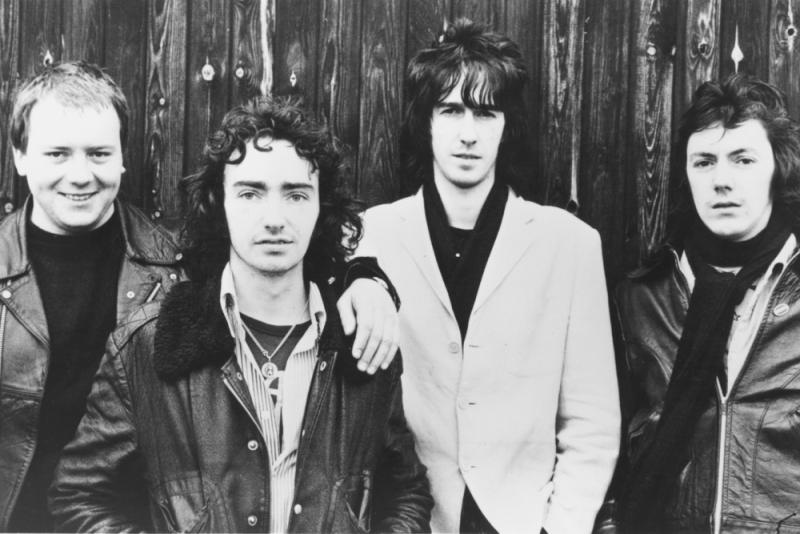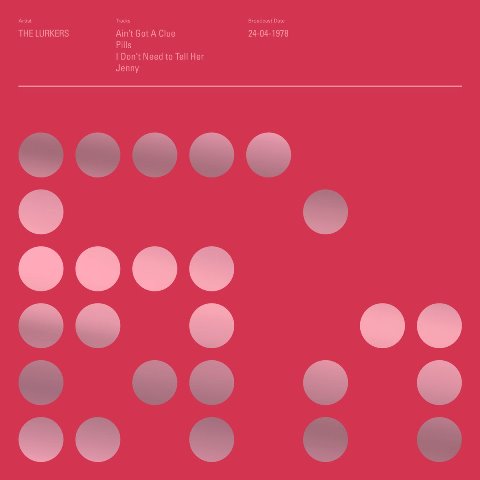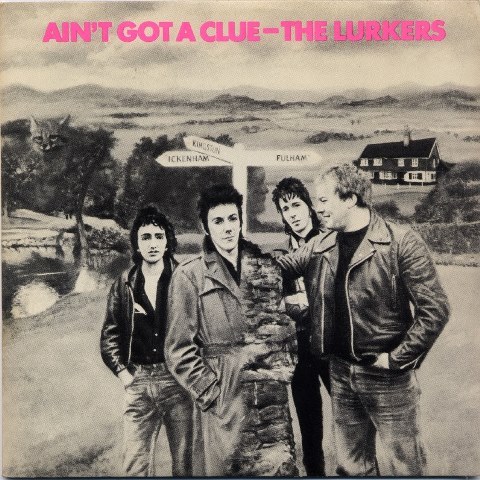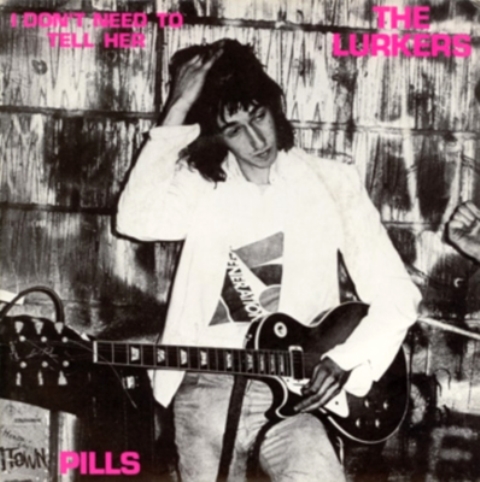Music Reissues Weekly: Beggars Arkive - The Lurkers’ 1978 John Peel session | reviews, news & interviews
Music Reissues Weekly: Beggars Arkive - The Lurkers’ 1978 John Peel session
Music Reissues Weekly: Beggars Arkive - The Lurkers’ 1978 John Peel session
Vital components of British punk rock and what followed

On its own, the second session The Lurkers recorded for the BBC’s John Peel show on 18 April 1978 is arguably a curio, a footnote. Four tracks of bracingly straight-ahead Brit-punk with a headstrong freshness undiminished by time. But whatever the impact, The Lurkers were never a main-agenda band, and the Peel session was an adjunct to their discography.
The Peel session has resurfaced on a 12-inch, clear-vinyl EP as part of the Beggars Arkive series of releases: an archive exercise digging into Beggars Banquet, the label The Lurkers were on. Available as a stand-alone release, the record is also collected as part of a box set alongside other EPs of BBC Radio sessions by Beggars-related bands: The Charlatans, The Fall, Silverfish and more.
 Despite their mid-level punk pecking-order status, The Lurkers themselves were significant in more than one way; for more than the music they made. They were the subject of the first record issued by the still-thriving Beggars Banquet. Also, this particular Peel session caught a band on the way up. Punk may have been 1977’s thing but three weeks after the session aired on 24 April 1978, The Lurkers released their third single, the ever-fantastic “Ain’t Got a Clue.” This was a different Lurkers to what had previously been on vinyl: no scrappiness, deeply propulsive and melodically sharp. It rocked.
Despite their mid-level punk pecking-order status, The Lurkers themselves were significant in more than one way; for more than the music they made. They were the subject of the first record issued by the still-thriving Beggars Banquet. Also, this particular Peel session caught a band on the way up. Punk may have been 1977’s thing but three weeks after the session aired on 24 April 1978, The Lurkers released their third single, the ever-fantastic “Ain’t Got a Clue.” This was a different Lurkers to what had previously been on vinyl: no scrappiness, deeply propulsive and melodically sharp. It rocked.
Their first single, August 1977’s reductive “Shadow,” had been dismissed by NME’s Charles Shaar Murray as “punkorama third class.” The follow-up, November 1977’s “Freak Show” was “too plodding and sub-Ramones” according to Sounds’ Jon Savage. Both singles were, indeed, rough. But both were terrifically enjoyable. “Ain’t Got a Clue” was a major step up.
In Sounds Alan Lewis recognised the transformation in May 1978, saying of “Ain’t Got a Clue” that The Lurkers “have survived as one of the few bands playing pure punk, at a time when a lot of people are trying to pretend that punk never happened. They've retained that primitive aggression and simplicity, but tightened up so remarkably that they really do deserve to be considered as Britain's counterpart to The Ramones.”
 There was an audience. “Ain't Got a Clue” went to 45 in the Top 50, and (with help of a flexi-disc included in initial copies) sold 15,000 on its release. The next and fourth single, “I Don’t Need to Tell Her” got them onto Top Of The Pops. In-between the two, debut album Fulham Fallout peaked at 57 on the album charts. By the autumn, they were selling-out London’s 2000-capacity Lyceum Ballroom. There were more singles and a second album, but the band didn’t ascend further and, after altering their line up, they fell apart in 1980. Reunions followed.
There was an audience. “Ain't Got a Clue” went to 45 in the Top 50, and (with help of a flexi-disc included in initial copies) sold 15,000 on its release. The next and fourth single, “I Don’t Need to Tell Her” got them onto Top Of The Pops. In-between the two, debut album Fulham Fallout peaked at 57 on the album charts. By the autumn, they were selling-out London’s 2000-capacity Lyceum Ballroom. There were more singles and a second album, but the band didn’t ascend further and, after altering their line up, they fell apart in 1980. Reunions followed.
After forming in the Metroland suburbs of north-west London in late 1976, The Lurkers first played live that December. Band members had seen Sex Pistols at the 100 Club Punk Festival. Initially, they were: Pete “Manic Esso” Haynes (drums), Nigel Moore (bass), Pete Stride (guitar) and Howard Wall (vocals). Moore soon left, and was replaced by Arturo Bassick (Arthur Billingsley) who described their approach thus to Sounds in July 1977. "We strip away all the niceties that got into music in the last six years and made it boring" and to "get everything over in a really powerful way and keep it quick." By this point they were regularly playing live, including shows at prime punk venue The Roxy. They rehearsed in the basement of the Fulham branch of the Beggars Banquet record shop. Generation X, who The Lurkers supported, also rehearsed there. When Bassick left in autumn 1977, he was briefly replaced by former Saints bassist Kym Bradshaw. Moore then returned to the band – he is on this Peel Session.
This radio session (it has been out before on CD) includes versions of “Ain't Got a Clue,” “Jenny,” “Pills” (modelled on the New York Dolls version) and “Tell Her.” In this form, all are less powerful than the released versions, less dynamic. On this evidence it appears that Mick Glossop, producing them for Beggars Banquet around this time, was able to help them hone what ended up on record.
 Beggars Banquet the label sprang forth from a London chain of record shops of the same name. In common with the period’s other independent shops Bonaparte, Rough Trade and Small Wonder, they were faster moving and more responsive to edginess than major labels in the wake of punk’s arrival, so started their own label – basement dwellers The Lurkers were its debutantes. As well as the shops, Beggars had also promoted live shows: Tangerine Dream at The Royal Albert Hall in 1975, Graham Parker and the Rumour at the New Victoria (with The Damned as support) in 1976 amongst them. Branching out to create a record label wasn’t such a stretch. Especially as it was impossible to fail to notice the volume of punk singles flying out of the shop’s doors. They could sell self-generated records along such lines.
Beggars Banquet the label sprang forth from a London chain of record shops of the same name. In common with the period’s other independent shops Bonaparte, Rough Trade and Small Wonder, they were faster moving and more responsive to edginess than major labels in the wake of punk’s arrival, so started their own label – basement dwellers The Lurkers were its debutantes. As well as the shops, Beggars had also promoted live shows: Tangerine Dream at The Royal Albert Hall in 1975, Graham Parker and the Rumour at the New Victoria (with The Damned as support) in 1976 amongst them. Branching out to create a record label wasn’t such a stretch. Especially as it was impossible to fail to notice the volume of punk singles flying out of the shop’s doors. They could sell self-generated records along such lines.
But despite being the label’s first band, The Lurkers would not be Beggars Banquet’s long-term concern. Nor would Ivor Biggun and the Red Nosed Burglars, whose September 1978 novelty single “The Winker’s Song” was strong seller for the imprint. The lasting foundation arrived after Paul Gardiner came into the Earl’s Court shop in early 1978 and left a demo tape of his band Tubeway Army. The band’s leader was Gary Webb. Two OK-selling and musically OK Tubeway Army singles were issued in 1978. Waves were not made. Then, Webb became Gary Numan and the brooding, enveloping “Down in the Park” came out in March 1979. In May, Tubeway Army’s “Are ‘Friends’ Electric” changed everything. Gary Numan and Beggars Banquet had their future.
Without The Lurkers, there would have been no label for Gary Numan and Tubeway Army to court with a demo tape. The Lurkers are essential to Brit-punk, and because they inspired the formation of the Beggars Banquet label they are also vital to what followed in its wake. All of which makes The Lurkers’ April 1978 John Peel session show more than a curio, more than a footnote.
- Next week: Car Crash Supergroup - The Island Years 1973-1974. Box set dedicated to Sharks, the Seventies supergroup which didn’t quite click
- More reissue reviews on theartsdesk
- Kieron Tyler’s website
The future of Arts Journalism
You can stop theartsdesk.com closing!
We urgently need financing to survive. Our fundraising drive has thus far raised £49,000 but we need to reach £100,000 or we will be forced to close. Please contribute here: https://gofund.me/c3f6033d
And if you can forward this information to anyone who might assist, we’d be grateful.

Subscribe to theartsdesk.com
Thank you for continuing to read our work on theartsdesk.com. For unlimited access to every article in its entirety, including our archive of more than 15,000 pieces, we're asking for £5 per month or £40 per year. We feel it's a very good deal, and hope you do too.
To take a subscription now simply click here.
And if you're looking for that extra gift for a friend or family member, why not treat them to a theartsdesk.com gift subscription?
more New music
 Soulwax’s 'All Systems Are Lying' lays down some tasty yet gritty electro-pop
Belgian dancefloor veterans return to the fray with a dark, pop-orientated sound
Soulwax’s 'All Systems Are Lying' lays down some tasty yet gritty electro-pop
Belgian dancefloor veterans return to the fray with a dark, pop-orientated sound
 Music Reissues Weekly: Marc and the Mambas - Three Black Nights Of Little Black Bites
When Marc Almond took time out from Soft Cell
Music Reissues Weekly: Marc and the Mambas - Three Black Nights Of Little Black Bites
When Marc Almond took time out from Soft Cell
 Album: Mobb Deep - Infinite
A solid tribute to a legendary history
Album: Mobb Deep - Infinite
A solid tribute to a legendary history
 Album: Boz Scaggs - Detour
Smooth and soulful standards from an old pro
Album: Boz Scaggs - Detour
Smooth and soulful standards from an old pro
 Emily A. Sprague realises a Japanese dream on 'Cloud Time'
A set of live improvisations that drift in and out of real beauty
Emily A. Sprague realises a Japanese dream on 'Cloud Time'
A set of live improvisations that drift in and out of real beauty
 Trio Da Kali, Milton Court review - Mali masters make the ancient new
Three supreme musicians from Bamako in transcendent mood
Trio Da Kali, Milton Court review - Mali masters make the ancient new
Three supreme musicians from Bamako in transcendent mood
 Hollie Cook's 'Shy Girl' isn't heavyweight but has a summery reggae lilt
Tropical-tinted downtempo pop that's likeable if uneventful
Hollie Cook's 'Shy Girl' isn't heavyweight but has a summery reggae lilt
Tropical-tinted downtempo pop that's likeable if uneventful
 Pop Will Eat Itself's 'Delete Everything' is noisy but patchy
Despite unlovely production, the Eighties/Nineties unit retain rowdy ebullience
Pop Will Eat Itself's 'Delete Everything' is noisy but patchy
Despite unlovely production, the Eighties/Nineties unit retain rowdy ebullience
 Music Reissues Weekly: The Earlies - These Were The Earlies
Lancashire and Texas unite to fashion a 2004 landmark of modern psychedelia
Music Reissues Weekly: The Earlies - These Were The Earlies
Lancashire and Texas unite to fashion a 2004 landmark of modern psychedelia
 Odd times and clunking lines in 'The Life of a Showgirl' for Taylor Swift
A record this weird should be more interesting, surely
Odd times and clunking lines in 'The Life of a Showgirl' for Taylor Swift
A record this weird should be more interesting, surely
 Waylon Jennings' 'Songbird' raises this country great from the grave
The first of a trove of posthumous recordings from the 1970s and early 1980s
Waylon Jennings' 'Songbird' raises this country great from the grave
The first of a trove of posthumous recordings from the 1970s and early 1980s

Add comment